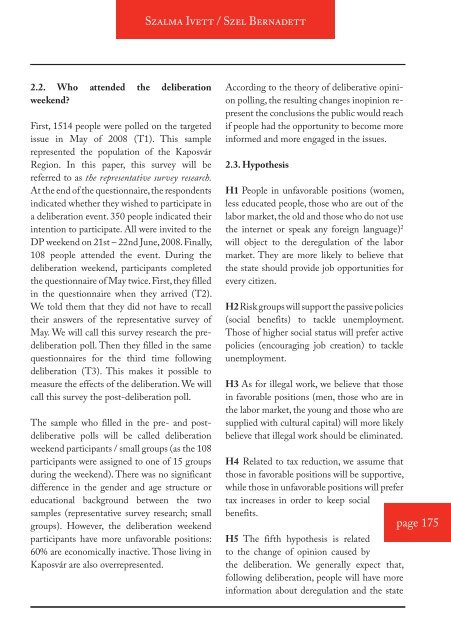Heft36 1 - SFB 580 - Friedrich-Schiller-Universität Jena
Heft36 1 - SFB 580 - Friedrich-Schiller-Universität Jena
Heft36 1 - SFB 580 - Friedrich-Schiller-Universität Jena
You also want an ePaper? Increase the reach of your titles
YUMPU automatically turns print PDFs into web optimized ePapers that Google loves.
SZALMA IVETT / SZEL BERNADETT<br />
2.2. Who attended the deliberation<br />
weekend?<br />
First, 1514 people were polled on the targeted<br />
issue in May of 2008 (T1). This sample<br />
represented the population of the Kaposvár<br />
Region. In this paper, this survey will be<br />
referred to as the representative survey research.<br />
At the end of the questionnaire, the respondents<br />
indicated whether they wished to participate in<br />
a deliberation event. 350 people indicated their<br />
intention to participate. All were invited to the<br />
DP weekend on 21st – 22nd June, 2008. Finally,<br />
108 people attended the event. During the<br />
deliberation weekend, participants completed<br />
the questionnaire of May twice. First, they filled<br />
in the questionnaire when they arrived (T2).<br />
We told them that they did not have to recall<br />
their answers of the representative survey of<br />
May. We will call this survey research the predeliberation<br />
poll. Then they filled in the same<br />
questionnaires for the third time following<br />
deliberation (T3). This makes it possible to<br />
measure the effects of the deliberation. We will<br />
call this survey the post-deliberation poll.<br />
The sample who filled in the pre- and postdeliberative<br />
polls will be called deliberation<br />
weekend participants / small groups (as the 108<br />
participants were assigned to one of 15 groups<br />
during the weekend). There was no significant<br />
difference in the gender and age structure or<br />
educational background between the two<br />
samples (representative survey research; small<br />
groups). However, the deliberation weekend<br />
participants have more unfavorable positions:<br />
60% are economically inactive. Those living in<br />
Kaposvár are also overrepresented.<br />
According to the theory of deliberative opinion<br />
polling, the resulting changes inopinion represent<br />
the conclusions the public would reach<br />
if people had the opportunity to become more<br />
informed and more engaged in the issues.<br />
2.3. Hypothesis<br />
H1 People in unfavorable positions (women,<br />
less educated people, those who are out of the<br />
labor market, the old and those who do not use<br />
the internet or speak any foreign language) 2<br />
will object to the deregulation of the labor<br />
market. They are more likely to believe that<br />
the state should provide job opportunities for<br />
every citizen.<br />
H2 Risk groups will support the passive policies<br />
(social benefits) to tackle unemployment.<br />
Those of higher social status will prefer active<br />
policies (encouraging job creation) to tackle<br />
unemployment.<br />
H3 As for illegal work, we believe that those<br />
in favorable positions (men, those who are in<br />
the labor market, the young and those who are<br />
supplied with cultural capital) will more likely<br />
believe that illegal work should be eliminated.<br />
H4 Related to tax reduction, we assume that<br />
those in favorable positions will be supportive,<br />
while those in unfavorable positions will prefer<br />
tax increases in order to keep social<br />
benefits.<br />
page 175<br />
H5 The fifth hypothesis is related<br />
to the change of opinion caused by<br />
the deliberation. We generally expect that,<br />
following deliberation, people will have more<br />
information about deregulation and the state
















